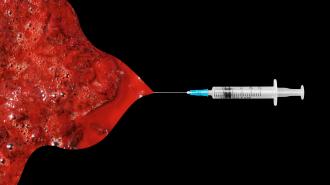A potentially life-saving treatment to stop severe bleeding after childbirth could soon be more accessible to the people who need it the most.
The challenge: Up to 5% of new parents experience severe bleeding after giving birth. This condition, known as “postpartum hemorrhage,” leads to 70,000 deaths every year, with most of them taking place in low- and middle-income countries.
To stop a postpartum hemorrhage, the WHO recommends administering the IV drug tranexamic acid (TXA) — which helps blood to clot faster — within 3 hours.
Every 15-minute delay in administering TXA reduces its benefit by about 10%.
That can reduce the risk of death by about one-third, but many people around the world give birth at home or in rural settings, without someone capable of inserting an IV catheter.
In some places, midwives aren’t legally allowed to administer IV drugs, meaning even if they know how, they might have to wait for a doctor to do it — and every 15-minute delay in administering TXA reduces its benefit by about 10%, according to the WHO.
The idea: The ability to get TXA as an oral medication or with a simple intramuscular shot (like the kind you get for a lot of vaccines) could reduce deaths from postpartum hemorrhage.
However, no one had ever compared the different ways to deliver the drug in people giving birth before, so it hasn’t been clear whether a shot of TXA in the arm would be as safe or work as well as the traditional IV drip.
The trial: To find out, an international team of researchers launched Woman-PharmacoTXA, a phase 2 trial involving more than 120 pregnant people in Pakistan and Zambia with at least one risk factor for postpartum hemorrhage.
Participants were divided into four groups. About one hour prior to their scheduled cesarean sections, three of the groups received TXA intravenously, intramuscularly, or orally. The fourth group received no preemptive treatment.
Based on blood tests, the oral administration of TXA did lead to target concentrations of the drug in participants’ bloodstreams, but it took an hour, suggesting that the approach wouldn’t be ideal for emergency situations.
The IV route reached the target the fastest and resulted in the highest concentrations of TXA, but the intramuscular shot did reach the target within about 10 minutes and maintained therapeutic levels for four hours.
The eight participants who experienced postpartum hemorrhage during the trial were in either the oral administration or no treatment groups, suggesting that the intramuscular shot may be effective as a prophylactic, although the study size wasn’t large enough to say for sure. No serious side effects were reported by any of the participants.
“We want to make this lifesaving treatment available to all women wherever they give birth.”
Ian Roberts
Looking ahead: This phase 2 trial was too small to determine whether administering TXA intramuscularly works as well as the standard IV approach, but the researchers plan to launch phase 3 trials involving 30,000 people later this year to find out.
“We have good reason to believe the intramuscular route will be as effective as the intravenous route to reduce postpartum bleeding,” said co-author Ian Roberts.
“In August, we are starting a large global trial to prove this in the hope that this will change WHO guidelines,” he continued. “We want to make this lifesaving treatment available to all women wherever they give birth.”
We’d love to hear from you! If you have a comment about this article or if you have a tip for a future Freethink story, please email us at tips@freethink.com.
